Senior officials in Jerusalem expressed significant disappointment after meetings with American special envoy Amos Hochstein concerning a potential ceasefire in southern Lebanon.
Hochstein is scheduled to meet with Lebanese Prime Minister Najib Mikati, Foreign Minister Abdullah Bou Habib, and Parliament Speaker Nabih Berri, who serves as a liaison to Hezbollah.
The message brought by Hochstein to the political echelon in Jerusalem was clear: without a ceasefire agreement between Israel and Hamas in the Gaza Strip, achieving a ceasefire with Hezbollah in Lebanon would be impossible.
Knowledgeable sources report that Hochstein conveyed to Prime Minister Netanyahu the need for an Israeli commitment to negotiate the 13 points of dispute on the land border with Lebanon, including the Shebaa Farms, as part of the ceasefire negotiations.
Israel had previously avoided such commitments and maintains ambiguity on this issue.
Hochstein indicated that even if a ceasefire with Hamas is achieved, negotiations with the Lebanese government could be protracted, potentially lasting about a year.
He is currently working on the principles of a future agreement.
The political echelon perceived that Hochstein aims to secure an agreement that would push Hezbollah forces 10 km away from the border, rather than implementing UN Resolution 1701, which mandates Hezbollah’s relocation beyond the Litani River.
Political sources in Jerusalem noted Hochstein’s protest against IDF forces entering Rafah, despite opposition from the Biden administration.
He inquired about Israel’s strategy post-occupation of Rafah, emphasizing that Israel needs a comprehensive plan for the aftermath to facilitate a ceasefire on the northern border.
The U.S. expects Israel to de-escalate security tensions in southern Lebanon to avoid an all-out military confrontation with Hezbollah, which could escalate into a regional war.
The U.S. fears that such a conflict could prompt Iranian intervention and involve Shiite militias from Iraq and Syria.
Despite relative calm on the northern front due to the Eid al-Adha holiday, the IDF estimates that Hezbollah will resume attacks after the holiday ends this Thursday. Hezbollah appears to be coordinating closely with Hamas, attempting to pressure Israel into a permanent ceasefire and withdrawal from Gaza.
In response, Israel plans to formulate a strategy for a prolonged and intense conflict in southern Lebanon to repel Hezbollah forces from the border while maintaining low-intensity operations in Gaza, similar to those in Judea and Samaria.




